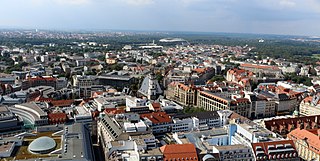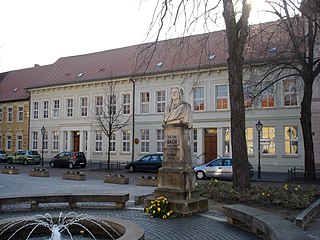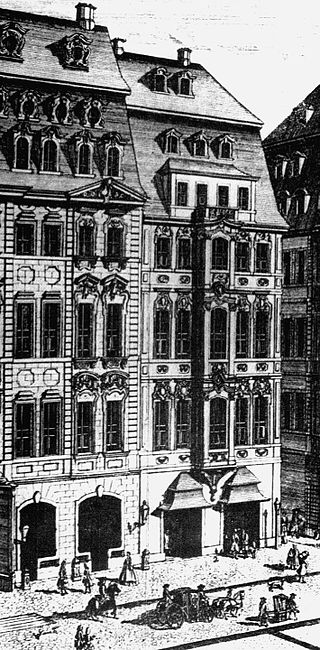
Georg Philipp Telemann was a German Baroque composer and multi-instrumentalist. He is one of the most prolific composers in history, at least in terms of surviving oeuvre. Telemann was considered by his contemporaries to be one of the leading German composers of the time, and he was compared favourably both to his friend Johann Sebastian Bach, who made Telemann the godfather and namesake of his son Carl Philipp Emanuel, and to George Frideric Handel, whom Telemann also knew personally.

Leipzig is the most populous city in the German state of Saxony. The city has a population of 628,718 inhabitants as of 2023. It is the eighth-largest city in Germany and is part of the Central German Metropolitan Region. The name of the city means "linden tree place" and is, like the names of most of Leipzig's districts and geographical features, of Slavic origin.

The St. Nicholas Church is one of the major churches of central Leipzig, Germany. Construction started in Romanesque style in 1165, but in the 16th century, the church was turned into a Gothic hall church. Baroque elements like the tower were added in the 18th century.

Masaaki Suzuki is a Japanese organist, harpsichordist, conductor, and the founder and music director of the Bach Collegium Japan. With this ensemble he is recording the complete choral works of Johann Sebastian Bach for the Swedish label BIS Records, for which he is also recording Bach's concertos, orchestral suites, and solo works for harpsichord and organ. He is also an artist-in-residence at Yale University and the principal guest conductor of its Schola Cantorum, and has conducted orchestras and choruses around the world.

The St. Thomas Church is a Lutheran church in Leipzig, Germany, located at the western part of the inner city ring road in Leipzig's central district. Martin Luther preached in the church in 1539. It is associated with several well-known composers, especially Johann Sebastian Bach, who was its Thomaskantor from 1723 until his death in 1750. The church holds his remains.
The Monteverdi Choir was founded in 1964 by Sir John Eliot Gardiner for a performance of the Vespro della Beata Vergine in King's College Chapel, Cambridge. A specialist Baroque ensemble, the Choir has become famous for its stylistic conviction and extensive repertoire, encompassing music from the Renaissance period to Classical music of the 20th century. They often appear with the English Baroque Soloists and Orchestre Révolutionnaire et Romantique, also founded by John Eliot Gardiner.

St. Thomas School, Leipzig is a co-educational and public boarding school in Leipzig, Saxony, Germany. It was founded by the Augustinians in 1212 and is one of the oldest schools in the world.

The Brühl is a street in the centre of Leipzig, Germany, just within the former city wall. Until the 1930s, it was the international centre of fur trade.
The International Johann Sebastian Bach Competition is a music competition in Leipzig, Germany, held by the Bach-Archiv Leipzig. It was founded in 1950 and was held every four years from 1964 to 1996 with five subjects and is now held every two years with three changing subjects violin / baroque violin, piano, harpsichord or in the fields of voice, cello / baroque violoncello and organ. From 1965 the competition is a member of the World Federation of International Music Competitions in Geneva.

The Bach House in Eisenach, Thuringia, Germany, is a museum dedicated to the composer Johann Sebastian Bach who was born in the city. On its 600 m2 it displays around 250 original exhibits, among them a Bach music autograph. The core of the building complex is a half-timbered house, ca. 550 years old, which was mistakenly identified as Bach's birth house in the middle of the 19th century. In 1905, the Leipzig-based Neue Bachgesellschaft acquired the building. In 1907, it was opened as the first Bach museum.

The composer Johann Sebastian Bach lived at two addresses during his stay in Köthen, Germany, while he was working for Prince Leopold of Anhalt-Köthen. The first of these properties has been demolished, so Bach House normally refers to the extant building which the composer occupied in the period 1719–23. This property is on Wallstraße and was completed in 1719: Bach is assumed to have been the first tenant of the house. Documentary evidence of the allowances paid to Bach suggests that the house was also used by the court orchestra.

The Bach-Archiv Leipzig or Bach-Archiv is an institution for the documentation and research of the life and work of Johann Sebastian Bach. The Bach-Archiv also researches the Bach family, especially their music. Based in Leipzig, the city where Bach lived from 1723 until his death, the Archiv is recognised by the German government as a "cultural beacon" of national importance. Since 2008 the Bach-Archiv has been part of the University of Leipzig.

Divi Blasii is a Gothic church in the Thuringian town of Mühlhausen, central Germany. Besides St Mary's, it is one of Mühlhausen's two principal churches. Divi Blasii is a three-aisle, cruciform hall church, situated on the Untermarkt in the historical centre of the town. The elaborately designed display façade with tracery, pinnacles and a wheel window on the north side is located on an old trade route. Today, Divi Blasii is the central parish church of the Lutheran parish of Mühlhausen within the Protestant Church in Central Germany.
Bekennen will ich seinen Namen, BWV 200, is an arrangement by Johann Sebastian Bach of an aria from Gottfried Heinrich Stölzel's passion-oratorio Die leidende und am Creuz sterbende Liebe Jesu. He scored it for alto, two violins and continuo, possibly as part of a cantata for the feast of Purification. He probably led the first performance around 1742.

The Café Zimmermann, or Zimmermannsches Kaffeehaus was the coffeehouse of Gottfried Zimmermann in Leipzig which formed the backdrop to the first performances of many of Bach's secular cantatas, e.g. the Coffee Cantata, and instrumental works.
Michael Maul is a German musicologist noted for his work on Johann Sebastian Bach. Maul was born in Leipzig, and is still based in the city, although his work at the Bach Archive has involved travel to archives and libraries across Germany in search of new sources relating to Bach. He is also artistic director of Leipzig's annual Bach festival.
Uwe Wolf is a German musicologist. He worked for the Johann Sebastian Bach Institute in Göttingen and Bach-Archiv Leipzig, where he developed the Bach Digital website. Since 2011, he has been chief editor of Carus-Verlag, editing the 2013 edition of Monteverdi's Vespro della Beata Vergine, among others.
Peter Wollny is a German musicologist, a Bach scholar who has served the Bach Archive Leipzig beginning in 1993, and as its director from 2014. Wollny has contributed to the Neue Bach-Ausgabe, and has been an editor of Carl Philipp Emanuel Bach: The Complete Works. He has been professor at the University of Leipzig, and teaching internationally. He received an honorary doctorate from the University of Uppsala.

The Oper am Brühl was the first opera house in Leipzig. It existed from 1693 to 1720 and was the second municipal music theatre in Germany, after the Oper am Gänsemarkt in Hamburg. It was initiated by Nicolaus Adam Strungk who saw a potential audience during the three annual trade fairs in Leipzig. An opera house was built, and opened on 8 May 1693. The house flourished when Georg Philipp Telemann directed the opera from 1703 to 1705. Among his operas for the house is Germanicus, premiered in 1704. A collection of 100 excerpts from the operas, Musicalische Rüstkammer, has been explored for background. The building was found in a dangerous state in 1719, was closed in 1720 and demolished in 1729.

The Old Town Hall, which dominates the east side of the Markt square in Leipzig's district Mitte, is considered one of Germany's most important secular Renaissance buildings. At the rear is the Naschmarkt. The mayor and the municipal administration have been housed in the New Town Hall since 1905.














